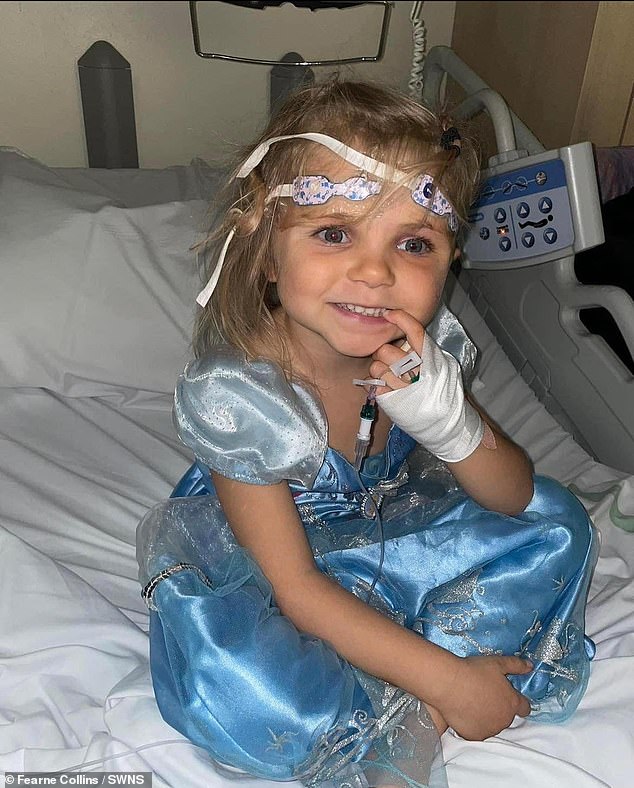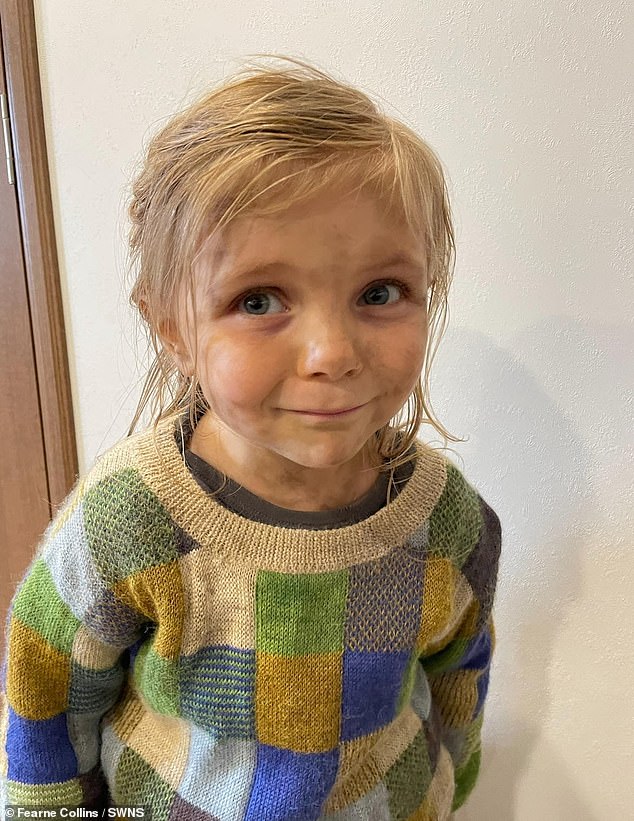Six-year-old Hollyoaks star paralysed by stroke doctors say was caused by extremely common childhood viral infection
A six-year-old girl had to learn to speak again after suffering a stroke and being temporarily paralyzed by a chickenpox infection.
Child actor Avy Berry, from Middleton, Greater Manchester, required life-saving brain surgery but made a remarkable recovery.
She recently spent a year in Channel 4’s Hollyoaks, where she played Scott Drinkwell’s foster daughter, Miley Carson.
It is believed the stroke was caused by chickenpox, which she contracted four months earlier.
According to the Stroke Association, around 400 children in the UK suffer a stroke each year. In rare cases, infections such as chickenpox can increase the risk.
Six-year-old Avy Berry had to relearn how to speak after suffering a transient ischaemic attack (also known as a mini-stroke) and a stroke. Just weeks after her recovery, Avy landed a year-long role on Channel 4 soap Hollyoaks, playing Scott Drinkwell’s foster daughter, Miley Carson (pictured).

In October 2022, Avy suffered a stroke and underwent surgery to correct blood flow to her brain
Avy’s mother Fearne Collins, 31, realised something was wrong with Avy in April 2022 when she became unresponsive in her sleep and lost use of one side of her body.
Mrs Collins called an ambulance but by the time it arrived her symptoms had disappeared. They suspected it was a viral infection and that she had had a bad dream.
She then took Avy to the ER and a scan revealed she had suffered a mini stroke. She was put on a low dose of blood thinners.
In October 2022, Avy suffered a stroke and underwent brain surgery to correct blood flow to her brain.
Mrs Collins said: ‘She is now on high doses of blood thinners but that was 18 months ago and she has not had a stroke since then, which we are very pleased about.
‘There are some (permanent) symptoms because it is a brain injury, so emotionally she is still struggling and quite sensitive.
‘But I also think it’s partly medical in nature because it was quite horrible and the trauma of the hospital stay was there as well.
‘She would sleep and then wake up every hour for more blood tests, which was really hard because we had to hold her down for the needles.
‘She is still very afraid when someone has to go to the hospital.’
Mrs Collins asked her doctors why this had happened and they were told that the most likely cause was the chickenpox infection she had contracted.
Chickenpox, caused by the varicella-zoster virus, is a common childhood infection and in most children causes an illness characterized by a rash of itchy red spots over the entire body that lasts one to two weeks.
Complications include skin infections, which occur in one in ten cases, and pneumonia, a potentially life-threatening lung condition, in one in twenty.
In two percent of cases, the virus can cause swelling of the brain, also called encephalitis.
According to the Stroke Association, it has also been linked to an increased risk of stroke in children for about six months after infection, although this is extremely rare.
It is also reported that other serious infections, such as bacterial meningitis, encephalitis and sepsis, can also increase the risk of stroke in children.
A stroke occurs when the blood supply to part of the brain is cut off. This kills brain cells, which can affect how the body works, including how you think and feel.
Weakness on one side of the body, tingling in the arms and legs, seizures, and blurred vision are all warning signs of stroke in children.
After just a few weeks of recovery, Avy landed a year-long role on Channel 4 soap Hollyoaks, playing Scott Drinkwell’s foster daughter, Miley Carson.
She was also recently seen in theaters when she played a role in the Paramount Pictures horror film A Quiet Place: Day One.

Avy started acting when she was four and Ms. Collins says she enjoys it because she likes to “play” and talk to “all the people on set.”

She was also recently seen in theaters when she starred in the Paramount Pictures horror film A Quiet Place: Day One (pictured)
Avy started acting when she was four and Ms. Collins says she enjoys it because she enjoys “playing” and talking to “all the people on set.”
Mrs Collins, owner of the Elm Arts Company acting school, said: ‘She just loves to perform – that’s what acting is.’
“I think she enjoys doing that and honestly, she enjoys being the center of attention when she’s on set.
“She enjoys talking to all the adults and all the people on set. She really enjoys being there.”
Ms Collins is now trying to raise awareness about childhood strokes and is urging parents to have their children tested if necessary.
She said, “As a parent of a stroke survivor, I know you think it’s not your fault.
But if you have instincts, have them examined.
‘When I was in the hospital with Avy, only one person was allowed to be there, so I was often alone.
“The only comfort I found was news articles about children who had had strokes. It helped me to see a positive story.”
